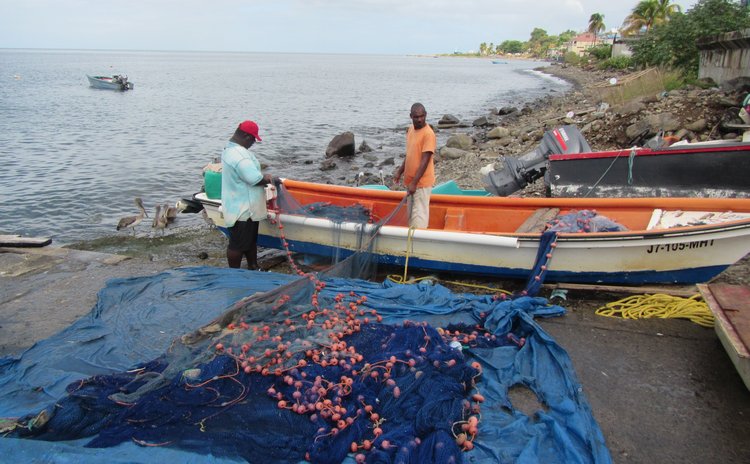Fisheries sector in Caribbean is the most vulnerable in the world to climate change

April 15, 2019 (Bridgetown, Barbados) – The impacts of climate change on the fisheries sector in the region are becoming more visible whereby the marginalized and vulnerable are expected to be disproportionally affected. A project launched by FAO will address the linkages between poverty and climate change and to improve climate resilient livelihoods and food security of fisherfolk in Barbados, Dominica and St. Kitts and Nevis as part of its Climate Change Strategy.
The launching workshop held on April 11-12 gathered over 15 participants attended including Mrs Joyce Leslie, Deputy Chief Fisheries Officer at the Ministry of Maritime Affairs and the Blue Economy in Barbados. Also in attendance were fisheries experts from FAO, The University of the West Indies (UWI), participants from the Caribbean Natural Resources Institute (CANARI), and other relevant institutes from Barbados and St. Kitts and Nevis.
The Caribbean region has been affected by climate change through gradually shifting weather patterns, rising sea levels, coral reef bleaching, sargassum influxes and increased frequency of high intensity storms and hurricanes are all clear and devastating evidence of a rapidly changing climate in the Caribbean region. Research by Dr. Iris Monnereau, Regional Project Coordinator for the CC4FISH Project and Coordinator of this project at the FAO Sub regional Office for the Caribbean and former UWI colleagues has shown the fisheries sector of Caribbean Small Island Developing States (SIDS) is considered the most vulnerable in the world to climate change.
"FAO's initiative seeks to reduce the exposure and vulnerability of the poor and vulnerable fishing communities to climate change and natural disasters, while building their resilience through enhancing fishers' capacity and giving them the adequate tools and strategies to manage such risks and to lift themselves out of poverty and vulnerable conditions. Likewise, by promoting the implementation of responsible fishing practices, it aims to achieve sustainability and reduce poverty, food insecurity and vulnerability to climate change impacts", said Ms. Daniela Kalikoski, Fishery Industry Officer and advisor of FAO's Strategic Programme on Reducing Rural Poverty.
This project assesses the linkages between the marginalized and vulnerable fisherfolk, climate change impacts, food security and livelihoods. The project activities include; value adding opportunities in the pelagic fish chain; opportunities for improved access to insurance for fisherfolk, use of fish silage and improved fish handling in the harvest and post-harvest sector with the aim of facilitating fisherfolks' productive inclusion, reducing the impacts of climate change on their livelihoods and enhancing their adaptation to it. The project also provides assistance for seeking outside funding for climate change mitigation and adaptation projects via development of proposals as well as mainstreaming of the fisheries sector into the National Determined Contributions (NDCs) and other relevant plans and policies. Addressing the linkages between climate change and poverty can be a key instrument into achieving the commitments set in the NDCs as well as the 2030 Agenda of leaving no one behind.
"This project is important as the impacts of climate change on the fisheries sector are becoming increasingly visible. Hurricane Maria, for example, had a devastating effect on the fisheries sector in Dominica in 2017. Not only was 40 percent of the vessels and gears damaged or lost with few insured fishers, the fisheries value chain was also severely impacted through the loss of ice machines and locker rooms of the market vendors, while fisheries management nearly impossible as the building of Fisheries Division was severely damaged and still not rebuild after 18 months. It has been 18 months since the hurricane, and the negative impacts are still visible and even though the fisheries sector is very flexible and adaptive by nature, many involved are still scrambling to become operational again. This project aims to support an improved understanding of the linkages between climate change and the vulnerability of fisherfolk while simultaneously improving the resilience of fisherfolk through a variety of hands-on activities", said Dr. Iris Monnereau.




